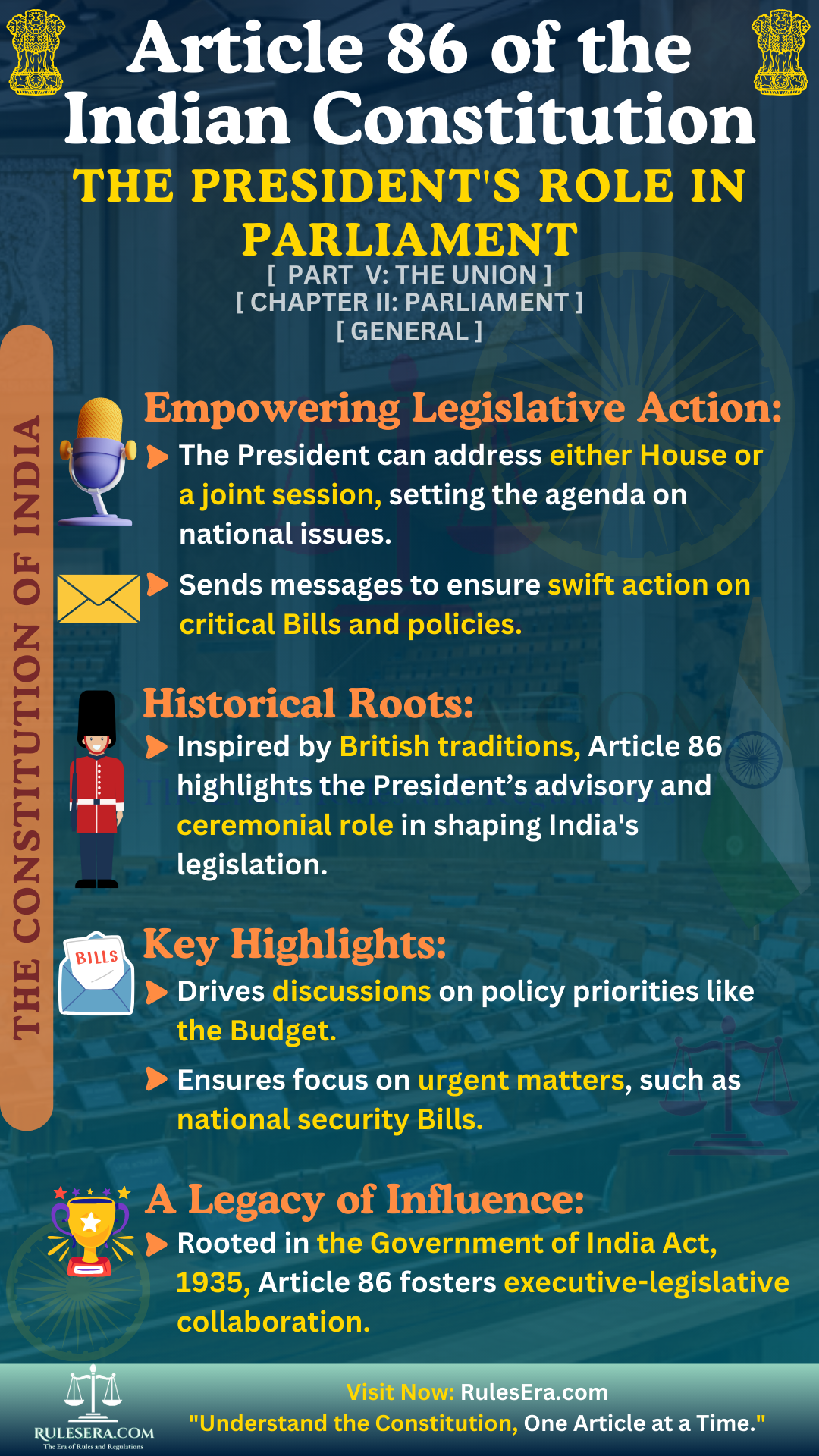Part V: The Union
Chapter II: Parliament
Article 86: Right of President to Address and Send Messages to Houses

--- Original Article ---
(1) The President may address either House of Parliament or both Houses assembled together, and for that purpose require the attendance of members.
(2) The President may send messages to either House of Parliament, whether with respect to a Bill then pending in Parliament or otherwise, and a House to which any message is so sent shall with all convenient despatch consider any matter required by the message to be taken into consideration.
Explanations
Article 86 of the Constitution establishes the President's authority to engage with the legislative bodies by addressing Parliament or sending messages. This Article reflects the President’s constitutional prerogative to influence and engage in the legislative domain, bridging executive and legislative responsibilities.
Clause-by-Clause Breakdown
Clause (1): Presidential Address to Parliament
The President’s power to address either House, individually or in a joint session, is codified in Clause (1). This power emphasizes the President’s unique position in communicating issues of national interest, initiating discussions on governmental policies, or setting a broader legislative agenda.
Clause (2): Presidential Messages to Parliament
Clause (2) extends the President’s ability to send messages to either House on pending bills or other significant matters. This clause ensures that the President can influence parliamentary considerations by highlighting specific issues or urging swift legislative action. The receiving House is constitutionally obliged to prioritize such messages, thus reinforcing the President’s role in guiding parliamentary discourse.
Historical Background and Significance
The foundation of Article 86 lies in the British constitutional tradition, wherein the Monarch would address Parliament and convey messages on critical issues. This tradition has been adapted to the Indian context, signifying the importance of the President’s advisory role in legislative affairs. Article 86 thus reflects a blend of ceremonial and consultative functions, allowing the President to play an active role in shaping parliamentary priorities.
Real-life Applications and Instances
- Policy Guidance: Presidents have historically addressed Parliament on various policy matters. For example, the President’s address at the commencement of the Budget Session often outlines the government’s objectives, priorities, and vision for the upcoming fiscal year.
- Legislative Input: Messages sent by the President regarding pending bills highlight the importance of timely legislative action. For instance, if the President sends a message on a critical bill, such as those concerning national security, the concerned House is obligated to give it prompt consideration.
Amendments and Evolution
While no specific amendments have been made to Article 86, the provision remains instrumental in preserving the continuity of executive-legislative interaction. Its application has evolved with the office of the President, balancing ceremonial duties with the President’s consultative role in legislative matters.
References
- Article 86 derives its essence from the Government of India Act, 1935, which provided similar powers to the Governor-General.
- Its application can also be compared to similar practices in other parliamentary democracies, underscoring the importance of the President's advisory role in shaping legislative proceedings in India.
Legislative History
Article 86 of the Indian Constitution, initially drafted under the designation Article 70, was officially ratified and included in the Constitution on May 18, 1949.
Debates and Amendments
During the constituent assembly sessions, Mr. Kamath proposed verbal amendments to this article, which were not discussed in the assembly but referred to the drafting committee for review. Apart from Mr. Kamath's proposals, no other honorable member suggested debates or amendments. Consequently, the article was adopted by the Constituent Assembly without any further deliberation, remaining unchanged.
Frequently Asked Questions (FAQs):
Yes, the President has the constitutional power to address either House of Parliament or both Houses assembled together.
Yes, a House to which the President sends a message must promptly consider the matter mentioned in the message, giving it priority.